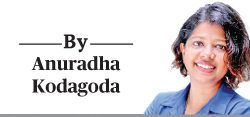 “Women are the real architects of society,” said American author Harriet Beecher Stowe and this sentiment strikes a chord deeply across any culture or community and any time period.
“Women are the real architects of society,” said American author Harriet Beecher Stowe and this sentiment strikes a chord deeply across any culture or community and any time period.
As the smallest yet central unit of any society, families are nurtured and shaped by women, who have consistently played pivotal roles in building and transforming communities, from raising future generations to leading movements for social change.
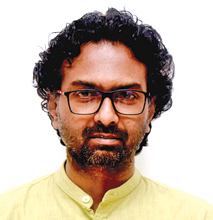
Kaushalya Kumarasinghe
Director – SAARC Cultural
Centre Sri Lanka
In celebration of this year’s Women’s Day, the SAARC Cultural Centre organised an online forum focused on the 20th Century South Asian Women in Culture. Set for March 11, this event will shine a spotlight on five remarkable women from Bangladesh, India, Nepal, Pakistan and Sri Lanka, each of whom has left an indelible mark on their respective fields.
Leading the discussion will be a diverse line-up of speakers; Jinat Ara Haque from Bangladesh will share insights about the trailblazing Begum Sufia Kamal, a poet, feminist leader and political activist. Dr. Kumud Bansali from India will delve into the life of Irvati Karve, a pioneering sociologist and educationist. From Nepal, Prof. Sangeeta Ramajhi will honour Parijat, a celebrated writer and poet. Dr. Nabiha Fatima from Pakistan will reflect on the legendary Noor Jehan, a beloved playback singer and actress, while Irushi Tennakoon from Sri Lanka will discuss the contributions of Minnette De Silva, the first woman to bring modern architecture to Sri Lanka.
Advancing cultural dialogue
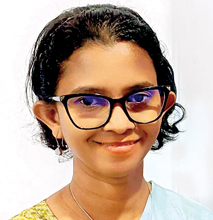
Apsara Karunaratne
Specialist – Research- SAARC Cultural Centre Sri Lanka
In an interview with the Sunday Observer, Deputy Director Dr. Bina Gandhi Deori and Cultural Specialist – Research Apsara Karunaratne of the SAARC Cultural Centre shared insights from an online forum and discussed future initiatives aimed at advancing the cultural dialogue within the region. “The core idea of the forum is to highlight the contributions of 20th-century South Asian women in culture by placing them within the context of significant historical changes in the region,” Dr. Deori opened the discussion and said, “The early 1900s were marked by great expansion and transition, both globally and in the Indian subcontinent.” She said crucial watershed events included the struggle for sovereignty from colonial rule, the rise of nation-states, the adoption of development-led economic models, and the growth of transnational ties, all of which contributed to a heightened sense of swadeshi fervor.
“These changes were particularly important in raising the social standing of women in South Asia”, Dr. Deori added. It is against this backdrop that the SAARC Cultural Centre seeks to reflect on the remarkable contributions made by 20th-century South Asian women in culture to commemorate this year’s International Women’s Day.
Alternative narratives
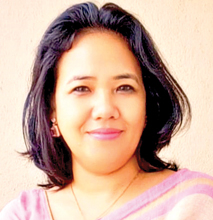
Dr. Bina Gandhi Deori
Deputy Director – SAARC Cultural Centre Sri Lanka
Women empowerment initiatives have been a top-notch topic of the 21st century and many projects and funding have been dedicated to this cause over the past few decades, especially in developing countries such as ours. These efforts have somewhat addressed issues such as gender-based violence, economic inequality, women’s representation in politics, and girls’ rights, among other aspects related to women empowerment. However, the cultural backwardness that still affects many South Asian women remains a significant challenge. This is largely due to cultural constraints and a lack of access to education, while the dominant cultural narratives surrounding women in the region also play a major role in sustaining this backwardness in society.
Cultural backwardness
In South Asia, women’s identities have often been shaped by grand narratives and mythologies, leaving little room for individual and personal stories. This lack of representation further contributes to cultural backwardness in the region. Given this context, it is crucial to introduce and amplify diverse narratives of independent women in South Asia. When asked about the impact of these narratives on transforming societal perceptions and gender roles, Apsara Karunaratne said,“It is paramount to change the narrative that has shaped the discourse on women.
We hope that this event will serve as a platform for individuals from different backgrounds to engage in insightful discussions about 20th-century South Asian women in culture and to appreciate their lives and works. We also hope that such engagements will create awareness and inspire others about resilience, motivation, and empowerment, encouraging individuals to pursue their dreams beyond societal norms.
These women have defied the dictates of the traditional role as perceived by society in their times. All these women emerged victorious, overcoming all odds and social barriers, and they refused to be ignored in arenas largely dominated by men.
These forerunners paved the way for future generations of women through their persistence, hard work, and integrity. They have widened the landscape of possibilities and inspired generations to hope beyond boundaries.”
The course of SCC
The SAARC Cultural Centre (SCC) is a regional center established under the South Asian Association for Regional Cooperation (SAARC), which comprises eight member states, Afghanistan, Bangladesh, Bhutan, India, Maldives, Nepal, Pakistan, and Sri Lanka. Founded in 2009, the center was mandated following the Fifteenth SAARC Summit in Colombo on August 2-3, 2008, where the Heads of State or Government directed that the Agenda for Culture be fully implemented.
The objectives of the Centre include promoting regional unity through cultural integration and intercultural dialogue, as well as contributing to the preservation, conservation, and protection of South Asia’s cultural heritage within the framework of the SAARC Agenda for Culture.
The Centre is tasked with conducting and facilitating programs focused on performing arts, visual and fine arts, archaeology, ancient material culture, museology, literature, folklore, folk culture, poetry, diminishing arts, and related traditions. Since 2010, the SCC has served as an active meeting point for experts in the field of culture, conducting various programs and activities such as seminars, conferences, workshops, talk series, artist camps, film festivals, cultural festivals, handicraft exhibitions, and publications.
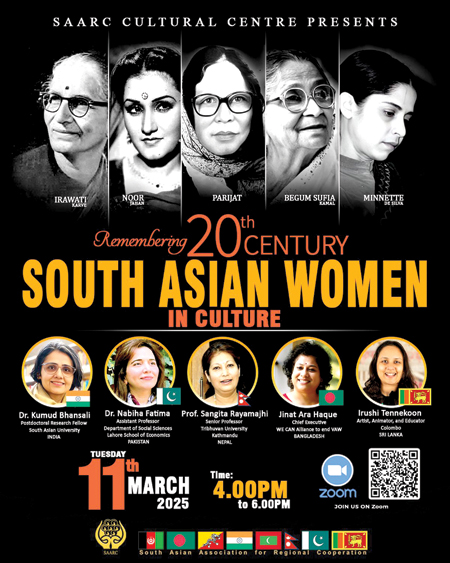 Regarding the proposed activities for 2025, Dr. Deori said that the SCC has aligned its initiatives around the theme of “Cultural Education: Awareness, Innovation, and Adaptation.” She said that this theme emphasizes the crucial role of culture in bringing the peoples of South Asia closer together. Dr. Deori noted that in the transition to knowledge-based economies, the growing importance of cultural awareness is key to achieving unity through cultural integration.
Regarding the proposed activities for 2025, Dr. Deori said that the SCC has aligned its initiatives around the theme of “Cultural Education: Awareness, Innovation, and Adaptation.” She said that this theme emphasizes the crucial role of culture in bringing the peoples of South Asia closer together. Dr. Deori noted that in the transition to knowledge-based economies, the growing importance of cultural awareness is key to achieving unity through cultural integration.
Through its various proposed programs, the SCC plans to gather artists, craftsmen, performers, scholars, and intellectuals from different SAARC member states to discuss artistic influences, identity, and to create awareness about the shared cultural heritage of South Asia.
Dr. Deori remarked that these dialogues will serve as platforms for building enduring bonds and fostering mutual respect. For more information about past and ongoing activities of the SAARC Cultural Centre, she encouraged visiting the website at www.saarcculture.org as well as their Facebook and Twitter accounts.
Ongoing initiatives
The SAARC Cultural Centre’s mandate primarily focuses on the preservation, conservation, and protection of South Asia’s cultural heritage within the framework of the SAARC Agenda for Culture.
Dr. Bina Gandhi Deori said that while women empowerment is not the direct focus of the SAARC Cultural Centre, it has been an important initiative of the SAARC Development Fund, which is one of SAARC’s specialized bodies headquartered in Thimphu, Bhutan. She noted that the SAARC Development Fund, through its comprehensive funding mechanism, supports projects related to livelihood initiatives, networking, capacity building for women entrepreneurs, sanitation and hygiene, and enhancing the livelihoods of small farmers within the SAARC region.
For further details on these initiatives, Dr. Deori encouraged visiting the SAARC Development Fund’s website at https://www.sdfsec.org/.
When asked about the steps taken by the SAARC Cultural Centre to ensure women’s participation in its activities, Dr. Deori mentioned that the Centre tailors its programs to include diverse segments of South Asian society. However, she clarified that the responsibility for nominating participants falls to the sending governments of SAARC Member States, which should be mindful of fair representation of women in the Centre’s activities.
Dr. Deori highlighted several programs the SAARC Cultural Centre has conducted in commemoration of International Women’s Day. In 2023, in collaboration with the Swami Vivekananda Cultural Centre, High Commission of India in Colombo, the Centre organised a lecture titled “Divine Hands that Lulls the World,” presented by the Director of the SAARC Cultural Centre. In previous years, the Centre has hosted various programs, including in 2019, a collaboration with the University of Visual and Performing Arts in Sri Lanka, under the theme “A Celebration of the Struggles, Triumphs, and Legacy of Women.”
In 2018, the Centre partnered with the Department of Cultural Affairs in Sri Lanka to conduct a program themed “A Mother’s Song: An Aesthetic Journey through South Asia in Search of the Rhythms of Love.” In 2017, the Centre honored several iconic pioneering women artists and educators, including Sri Lankan artists Iranganie Serasinghe, Vajira Chitrasena, Sumithra Peiris, and Mary Anne David.
The Centre also celebrated International Women’s Day in 2016 with the performance of “Baawre Mann Ke Sapne (Sound of Dreams),” a national award-winning all-women theatre production, in collaboration with the Indian Cultural Centre in Colombo. Earlier, in 2013, it held a panel discussion on entrepreneurship, culture, and social services in collaboration with the Governor’s Office of Southern Province.
In 2012, a panel discussion on “Cultural Identity and Contribution of Women in South Asia” featured well-known Sri Lankan women achievers in the arts and culture.
Future events
Speaking about future events that the SCC plans to organise, which focus on the role of women today in shaping inclusive and progressive societies in South Asia, Karunaratne said, “There will be a series of forums under the theme ‘Women in Culture’ to highlight the achievements of women in cultural fields, discuss the challenges and issues faced by women from various cultural backgrounds in the region, and foster dialogue on strategies for overcoming cultural barriers.”
Inclusive and equitable society for everyone
Kaushalya Kumarasinghe
Director – SAARC Cultural Centre
“We believe it is essential to revisit the twentieth century on occasions like Women’s Day, not because these “days” inherently carry a commemorative tone, but because the first half of the twentieth century and the latter part of the nineteenth century serve as foundational to the modern socio-political and cultural frameworks of our contemporary world. Regarding women, this era saw towering figures who confronted various power dynamics across fields to build a more inclusive and equitable society, not only for women but for humanity as a whole. As de Tocqueville observed, it was a time when “the past had ceased to throw its light upon the future.” Reflecting on their efforts, undertaken during a period when humanity grappled with obscurity, continues to illuminate both our present and future.
To keep the light of the past steady upon the present and the future, we are inevitably drawn to revisit the twentieth century from time to time.”









